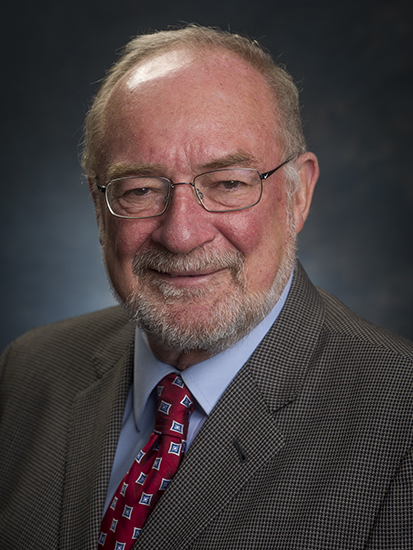 John Kearney, Ph.D., Distinguished Professor and Endowed Professor in Immunology in the UAB Department of Microbiology, will officially retire from UAB on Sept. 30, 2025, after more than five decades of service to the institution.
John Kearney, Ph.D., Distinguished Professor and Endowed Professor in Immunology in the UAB Department of Microbiology, will officially retire from UAB on Sept. 30, 2025, after more than five decades of service to the institution.
Kearney’s five-decade career at UAB is defined by world-renowned research, numerous accolades, and a dedication to shaping the next generation of researchers, achievements that were recently highlighted as Kearney was recognized as the institution’s only 50-year service award recipient in spring 2025.
“Dr. Kearney’s career at UAB spans decades, a tenure marked by unwavering dedication, pioneering research, and profound mentorship,” said J. Victor Garcia-Martinez, Ph.D., professor and chair, Charles H. McCauley Endowed Chair in the Department of Microbiology. “He has been a cornerstone of our department, contributing greatly to the department’s mission of excellence in research, teaching, and service. His leadership and generosity have extended beyond the lab, providing vital support to departmental initiatives. His impact on our department and the broader scientific community is outstanding.”
As he reflects on his career, Kearney said it has been characterized by “a willingness to try new things, even if others think them foolhardy or unlikely to succeed, and to spend at least some time at the bench for as long as possible actually doing some experiments and keeping expectations for data production by other lab members a bit more realistic.”
Kearney’s career at UAB began in 1973 when he arrived from Australia with a degree in dentistry and a Ph.D. in immunology research. A unique skill set in immunology at the time, notably expertise in thoracic duct cannulations in mice, likely played a role in his recruitment. Kearney quickly became an integral part of UAB’s growing research enterprise. Rather than pursuing dental research, he collaborated with renowned immunologists Max Cooper, M.D., and Sandy Lawton, M.D., focusing on B lymphocytes, the antibody-producing cells of the immune system. His early work laid the foundation for a lifelong dedication to immunological research, earning him prestigious honors including the 2016 American Association for Immunology BioLegend Herzenberg Award for outstanding contributions to the field of immunology in the area of B cell biology. He is also a 2018 Fellow of the American Association for the Advancement of Science, a 2023 Distinguished Fellow of the American Association for Immunology, was the 2013 UAB Distinguished Faculty Lecturer, and earned the 2018 Dean’s Award for Excellence in Mentorship.
One of Kearney’s most impactful contributions came during a sabbatical in Germany in 1978, where he developed a special type of cell that could reliably produce pure monoclonal antibodies. This breakthrough helped facilitate the production of precise reagents for many areas of scientific research and in the early days of developing antibody-based treatments, which are now used to treat illnesses, including cancer and autoimmune diseases. His work has been cited more than 2,300 times and early on helped catalyze the global monoclonal antibody market, which is projected to reach $412 billion by 2029. The cell lines he has since developed continue to generate significant revenue for UAB and are widely used in biomedical research. Kearney’s persistence and innovative thinking—often in the face of skepticism—have defined his scientific legacy.
Beyond his research, Kearney has mentored nearly 50 graduate students and postdoctoral fellows, many of whom have gone on to lead in academia and industry. His dedication to training the next generation of scientists is one of the aspects of his career he values most, and he says that his career would not have been possible without his good fortune of having such wonderful colleagues.
“I have received frequent congratulations on my retirement, but for me it should be commiserations, because I have enjoyed my scientific life immensely,” Kearney said. “I hope to stay around for a while and still contribute at a lower level to the mission of the department.”